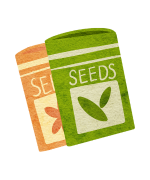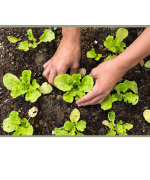What is the Seed Library?
The Fletcher Free NNE (New North End) Seed Library is a hub for local seed exchange and garden education. Patrons can “borrow” from our inventory of seeds to grow at home. Most seeds currently in stock are generous donations from neighbors, ACE Bibens Hardware, High Mowing Seeds, Seed Savers Exchange, the Vermont Wildflower Farm, the Chas C. Hart Seed Co, and others. At the end of the season, gardeners are encouraged, but are not required to, 'return' seeds that they saved from the plants they grew. The Seed Library also organizes and promotes educational events and resources relevant to gardening, seed saving, and local food.
Mission
In line with the Library’s mission 'to inform, enrich and nurture a community of lifelong learners', the Seed Library is committed to supporting our local gardening community, and encourage the new discoveries that come with growing plants from seed.
How to Borrow Seeds
- Visit FFL's New North End Branch
- Browse the Seed Library Shelf near the entrance.
- Select the Seeds you would like to "borrow". Place in bags provided or one of your own. Don't Forget to Label Them!
- Record your name, the seeds you take and the date in the Seed Library Record Book
- Grow and nurture your seeds. Check out our gardening programs with Vermont Garden Network or one of our many gardening books.
- Harvest and enjoy! If you would like, you can save your seeds to return to the Library. When returning seeds, fill out the Seed Donation Form.

Why Grow Food?
Growing our own food helps decrease our dependence on large-scale agriculture and food systems and increase our access to delicious, healthy, and diverse foods (read more here). Most importantly, it feels great to be outside in the garden with the birds and bees and plants and soil and sun. Imagine the magic of eating a vegetable that you grew from a tiny seed you “borrowed” from your community here at the Seed Library.

Why Save Seeds?
People have been saving seeds for more than 12,000 years. However, in our culture, much seed-saving knowledge along with significant biodiversity has been lost due to the prevalence of genetically modified varieties of plants (GMO’s) and large-scale agricultural practices. Biodiversity in food and agriculture increases the resilience of human and more-than-human communities by naturally resisting disease and pest issues; maintaining ecosystem health; enabling a nutritionally and medicinally diverse diet; and contributing aesthetic, ritualistic, and intellectual meaning to our cultures. By saving our own seeds, especially open-pollinated and heirloom varieties, and sharing them with our community, we are participating in one of nature’s greatest projects: the preservation and evolution of the cornucopia of lifeforms on Earth. Read more about the importance of seed saving here.
How To Donate Seeds!
Thank you for donating seeds to the FFL NNE Seed Library!
-
Please fill out the Seed Donation form available at the Checkout Desk.
-
Give Donation form and seeds (well labeled and in a sealed bag or envelope please.) to the Librarian at the Desk.
-
In no time, those seeds will spring to life in someone's garden.
Further Resources
List of recommended gardening and seed-saving books and websites
List of Gardening Classes held at FFL NNE
Germination test (for seeds that are 1-2 years old)
"If you have a garden and a library, you have everything you need" - Cicero